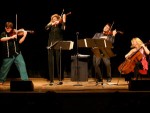Column Name
Title
Described as the “fiercest string quartet this side of hell,” Ethel is celebrating 10 years of melding genres from blues to jazz to classical with their newest project, TruckStop, designed to explore the palette of musical cultures in communities throughout the U.S. The quartet—all Juilliard alumni—has spent its anniversary year traveling to 10 different cities within 10 months, presenting residencies, performing concerts and collaborating with artists of every genre. Violinist Mary Rowell and violist Ralph Farris filled in some details.
Body
You’ve performed with a really divergent list of artists in this project: Kaotic Drum Line, a group of shape note singers, bluegrass’s Dean Osborne, even poets. What was one of the most memorable TruckStops?
Farris: Our very first TruckStop was with James Bilagody, the Navajo poet and singer. At the invitation of James’s daughter, Jessie, who had been our student at the Grand Canyon Music Festival’s Native American Composers Apprenticeship Project, we descended upon the Bilagody home and all piled into the living room. James and his wife Del were so very gracious, welcoming this surprise jam session with iced tea and a scrumptious stew. James suggested that we try together something that we had never done before, but had always wanted to. We started to play, tentatively at first, and then James started to speak. And then James started to chant. Pure magic. James’s and Ethel’s voices came together in a space of beauty, and power, and love. We chanted, James cried. James rocked us gently, and we wept. We flew from space to earth and back and it was glorious. James joined us that weekend in performance at the Grand Canyon, and a few months after that, for Ethel Fair at Symphony Space in New York City. From that initial beautiful moment, from that inspired idea of James’s, sprouted this whole garden.
How are the TruckStop performances different from any other?
Farris: TruckStop is, at times, some of our least formally presented work—and at the same time, it is very rigorous, for we demand so much of ourselves in staying true (as best we can!) to the traditions that we’ve been living. There’s so much love in this work; you really feel the family vibe in a TruckStop event. And so much of the music is brand-new—created of that time, for that time, by Ethel and our collaborators.
Why did Ethel begin to reach into communities and start to do different kinds of performance?
Rowell: It was clear from the beginning, when we were forming Ethel, that we all wanted something different. Each of us had been “out there” on our own, and we felt like it was time to be true to our individual artistic goals. The openness to improvisation was there from the very start. We also formed Ethel Foundation for the Arts, and are all committed to going into classrooms and environments where we perform and talk to audiences made up of non-musicians. We were involved with outreach at Juilliard, and it really provided a taste for future work.
How did all this evolve into the TruckStop projects?
Rowell: We all had personal frustrations with being on the road; we’d never meet anybody and never got a sense of the communities where we performed. Ethel would come into town, perform a concert, and then leave for the next gig. We started saying to one another, “Wouldn’t it be nice to get a vibe of the town? What’s going on here; what’s the ethnicity?” So we started seeking out artists in areas where we were performing. We’d let them know we were coming to town and invite them to jam with us.
Why do you think TruckStop has caught the attention of both audiences and presenters?
Farris: TruckStop is a unique way for presenters to celebrate their own communities. By pairing Ethel with a local talent, either a hidden gem or a hometown superstar, a presenter is curating a special event made by, for, and in her or his community, creating the union of artistic worlds for the audience. We celebrate humanity with this work—both our differences and our similarities. Our TruckStop work always seeks to find the links on these bridges between our cultures, and there tend to be active musical handholds for our listeners to grab onto and join the adventure.
What is in the future for the TruckStop project?
Farris: TruckStop Europe is in the works. The idea is very inspiring to our friends at Muzieklab in Holland, who are building a tour for next summer. Several TruckStop recordings are in process. Next season will likely feature a TruckStop with young people at the 10 Days on the Island festival in Tasmania. We have designed a TruckStop curriculum for use in schools, festivals, and workshops, and are actively seeking ways to support the TruckStop community so that it will continue to grow and prosper. Already TruckStop artists are meeting up on their own and cross-pollinating.





